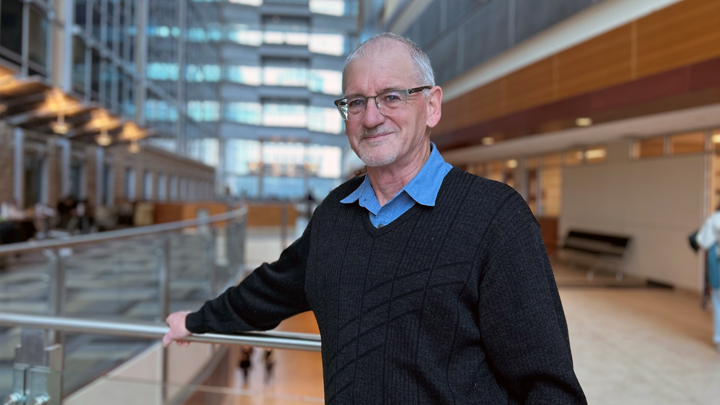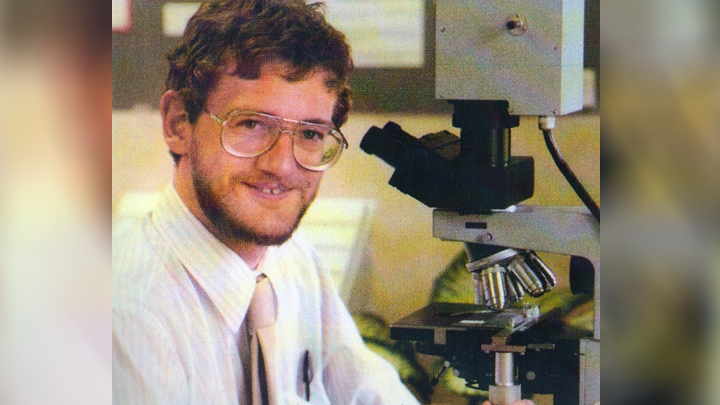
April 5, 2024

Dr. Graeme Dowling, retiring medical director of the AHS Comprehensive Tissue Centre, encourages all Albertans to register their wishes to be an organ or tissue donor. Photo by Su-Ling Goh.

Dr. Graeme Dowling is seen here in his early days in the medical examiner’s office in 1986. Photo supplied.
Story & photo by Su-Ling Goh
After three decades as a medical examiner — including 18 years as Alberta’s chief medical examiner — Dr. Graeme Dowling shifted in 2015 from determining how a person died to overseeing how their tissue donations are preserved.
Now, the medical director of the AHS Comprehensive Tissue Centre plans to retire at the end of this month. In a recent interview, Dowling took a moment to share his insights and reflect on his unique career path:
Q. You’ve had a career largely focused on death. How did you become interested in the subject?
A. I did pathology for a year during medical school… I spent one month with the then-chief medical examiner of Manitoba and that’s what started me.
For me, (forensic pathology) was a bit of a mystery — why had this person died? Even some violent deaths aren’t that obvious as to what happened. When I look back into my childhood, I realize that whenever I looked up a famous person — in those days we had encyclopedias — I always looked at the end of their history to see how they died. I don’t know why, but that’s what I did. [laughs]
Q: As a medical examiner, did you feel like you were doing a service to the families of those who died?
A: That to me was part of their coming to grips with a death that was often very tragic. All deaths are sad, but these were often much more than sad. You kiss your loved one goodbye in the morning and then get a call in the afternoon and they’re gone. I just thought that we helped a bit by helping families understand what happened.
Q: What interested you about the medical director role at the Comprehensive Tissue Centre (CTC)?
A: While I was serving as chief medical examiner — I don’t know how I had time for this — I became interested in tissue banking and the CTC. I somehow arranged with the deputy minister of justice to take half a day per week, go over to the CTC and sign out cases — ensuring that a donor is safe, that the tissues are safe — and giving medical release so they can be distributed.
There’s a crossover between forensic pathology and being the medical director for tissue banking that a lot of people don’t realize. Both are dealing with death and both include elements that forensic pathologists are very familiar with.
Q: During your nearly nine years at the CTC, what have you noticed about tissue donation awareness?
A: The majority of people know something about organ donation. But if you ask most people about tissues, they wouldn’t really know what you’re talking about.
Q: What would you like people to know about tissue donation?
A: Organ donation is crucial, it’s very important, it saves lives. But there’s a very limited number of people who can actually donate organs. They are people who have had some event that puts them into an intensive care unit, and they have been found to be what we call ‘brain dead’. But with tissue donation, that’s not the case. It’s a person who dies at home, or in hospital, they’re not in the ICU.
People say tissue donation is life-enhancing but not life-saving, and that’s not true. One of the tissues that’s recovered from donors is skin and it’s used for the treatment of severe burns. That is life-saving. Also heart valves can be recovered and transplanted — that, in many senses, is life-saving. Those valves work better and last longer than mechanical valves that are often used.
Q: You’re obviously much more comfortable talking about death than the average person would be. Why do you think it’s important that we talk about death and plan for our end of life?
A: I actually volunteer at Pilgrims Hospice. People go there to die as comfortably and as respectfully as possible. And that’s helped me, even given the rest of my career, to understand that death is a part of our life. It’s not a part we like to think about or plan for, but it is something we need to do.
Even (discussing) what type of service, what type of memories do I want after I’m gone. A part of that is knowing that you wanted to donate either tissue and/or organs and/or your body for medical education. Those are all things that help a family — who is suddenly without you — know what you wanted.
Albertans can register their decision to become an organ or tissue donor online at GiveLifeAlberta.ca.